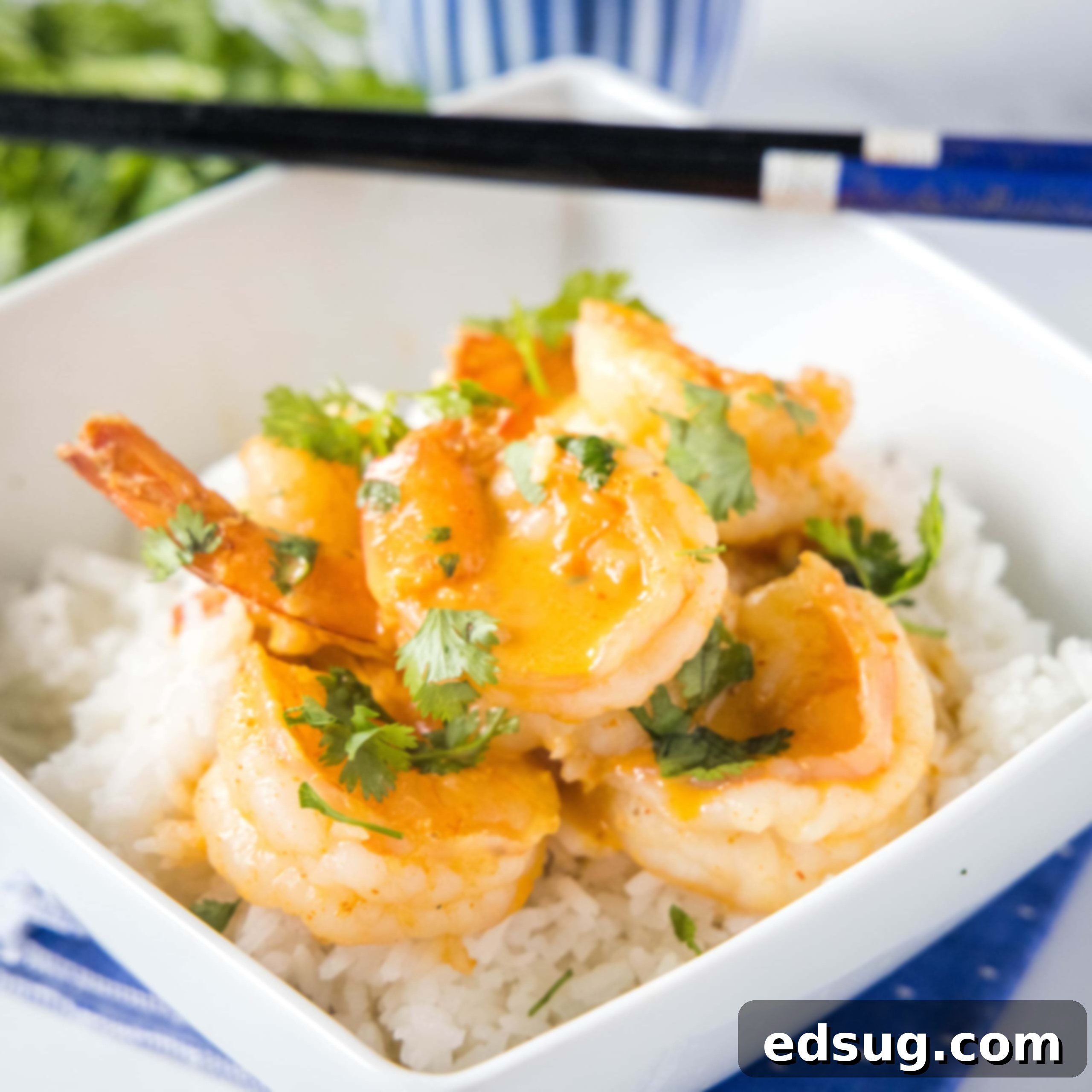Quick & Easy Thai Coconut Curry Shrimp: Your New Go-To Weeknight Dinner in Under 20 Minutes
Curry has a magical way of transforming simple ingredients into an extraordinary meal, bursting with rich, aromatic flavors. While I only discovered the incredible world of curry as an adult, it has quickly become a beloved staple in my kitchen. Among the myriad of curry recipes, this **Coconut Curry Shrimp** stands out for its vibrant taste, ease of preparation, and incredible speed. It’s a Thai-style curry that brings together plump, succulent shrimp with a creamy, sweet coconut curry sauce, all elevated by a subtle yet satisfying kick.
Imagine a dish that’s both exotic and comforting, ready on your table faster than ordering takeout. This recipe is exactly that – a culinary journey to Thailand accomplished in under 20 minutes, including all your prep time. Perfect for busy weeknights, spontaneous gatherings, or whenever you crave something truly delicious without the fuss, this quick coconut curry shrimp promises a delightful dining experience that’s simple, flavorful, and incredibly satisfying.
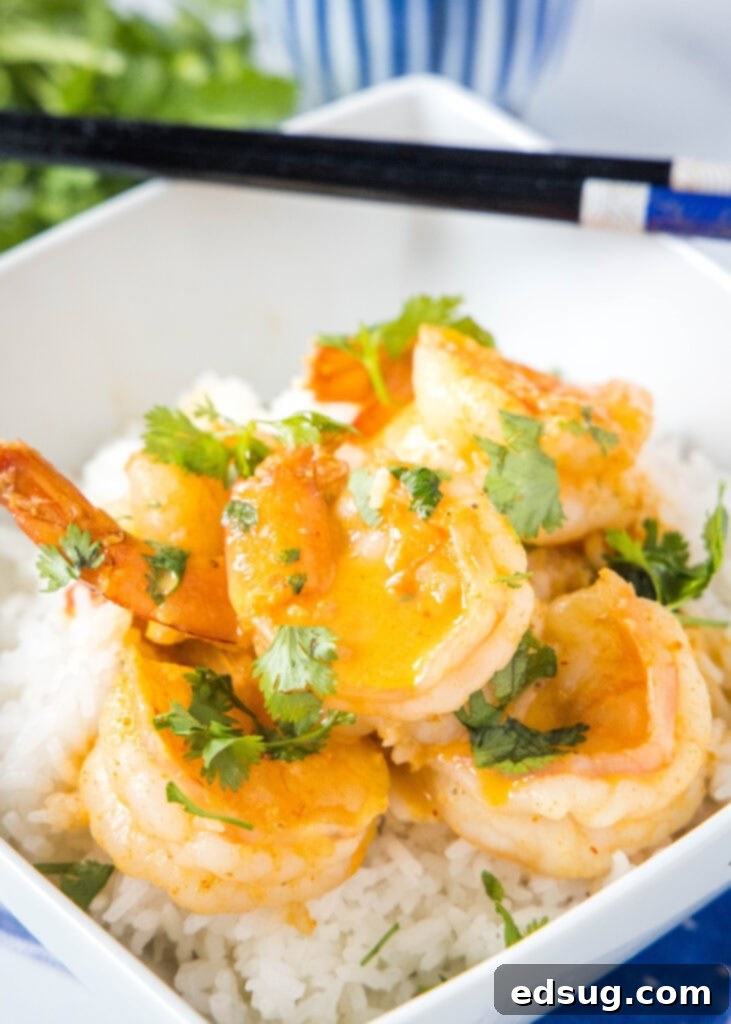
Why This Coconut Curry Shrimp Will Be Your New Favorite
Life can get hectic, and finding time to cook a wholesome, delicious meal often feels like an impossible task. That’s where this coconut curry shrimp recipe truly shines. It’s designed for efficiency without compromising on taste. From the moment you start prepping to the first forkful, you’re looking at less than 20 minutes. This makes it an ideal choice for busy weeknights, last-minute dinner plans, or simply when you want a gourmet-quality meal without spending hours in the kitchen.
The beauty of this Thai-inspired curry lies in its balanced flavors. The sweetness of coconut milk harmonizes with the bold, spicy notes of red curry paste, while fresh ginger and garlic add an aromatic depth. A touch of fish sauce introduces that essential umami that defines authentic Thai cuisine, making every bite a complex and rewarding experience. Plus, shrimp cooks incredibly fast, ensuring a tender and juicy texture when prepared correctly, which is key to a truly successful curry.
Essential Ingredients for Your Thai Coconut Curry Shrimp
Creating this flavorful dish requires a handful of key ingredients, most of which you can find in any well-stocked grocery store. For the best results, always opt for quality ingredients.
- Large Shrimp: Aim for fresh or frozen large shrimp, peeled and deveined. Thaw frozen shrimp completely before cooking. Large shrimp ensure a satisfying bite and are less prone to overcooking.
- Olive Oil: Used for sautéing the aromatics and coating the shrimp. A good quality olive oil can add a subtle richness.
- Fresh Ginger: Grated fresh ginger provides a warm, pungent, and slightly spicy flavor that is crucial for Thai curry. Avoid powdered ginger for this recipe, as it won’t yield the same vibrant taste.
- Fresh Garlic: Minced or grated fresh garlic complements the ginger beautifully, adding a robust aromatic base.
- Canned Coconut Milk: This is the backbone of your creamy curry sauce. Always use full-fat, unsweetened coconut milk from a can, typically found in the Asian aisle. We’ll delve deeper into why this is important below.
- Red Curry Paste: The primary flavor enhancer. Red curry paste is a blend of chilies, lemongrass, galangal, kaffir lime zest, and spices. It provides heat and complex flavor. Most grocery stores carry both red and green curry pastes. While this recipe uses red for its distinct profile, if you’re a fan of green, my Thai Green Curry Chicken is an absolute must-try!
- Fish Sauce: An indispensable ingredient in Thai cooking, fish sauce adds a salty, savory, and umami depth that elevates the entire dish. Don’t skip it!
- Salt and Pepper: To taste, allowing you to fine-tune the seasoning of your curry to your personal preference.
- Fresh Cilantro: Chopped cilantro is an excellent garnish, adding a burst of freshness and color.
- Green Onions (Scallions): Another fantastic garnish option, providing a mild oniony bite and bright color.
- Cooked White Rice: The perfect accompaniment to soak up all that delicious curry sauce.
Having all your ingredients prepped and measured before you start cooking is essential for this incredibly fast recipe. This “mise en place” approach ensures a smooth cooking process and prevents any last-minute scrambling.
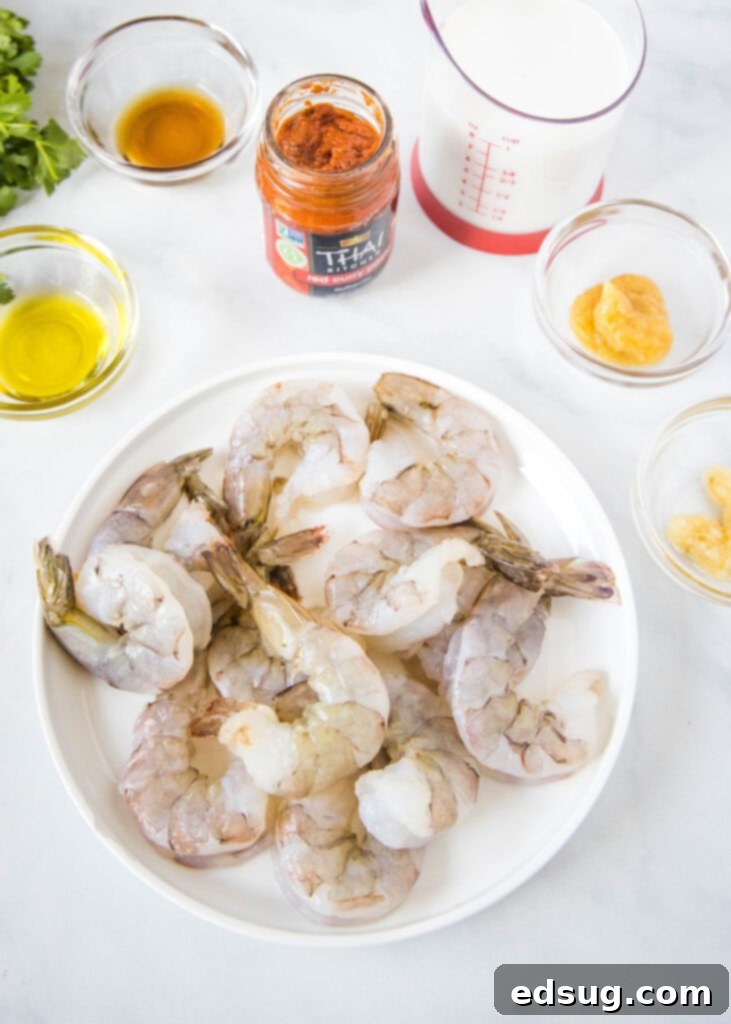
Mastering the 20-Minute Coconut Curry Shrimp: Step-by-Step
The key to the speed and success of this dish lies in preparing everything beforehand. Shrimp cooks very quickly, and you don’t want to risk overcooking it while you’re still gathering or measuring ingredients.
- Sauté Aromatics: Begin by heating the olive oil in a large skillet or wok over medium-high heat. Once shimmering, add the grated fresh ginger and garlic. Sauté for about 30 seconds, or until you can distinctly smell their fragrant aroma filling your kitchen. This “blooming” step releases their essential oils and deepens their flavor.
- Toast Curry Paste: Stir in the red curry paste, mixing it thoroughly with the ginger and garlic. Allow it to cook for another 30 seconds to a minute, stirring constantly. This step, often called “toasting” the curry paste, helps to bring out its full spectrum of flavors and aromas, creating a more robust foundation for your sauce.
- Add Shrimp: Introduce the peeled and deveined large shrimp to the skillet. Toss everything together, ensuring the shrimp are well coated with the aromatic curry paste mixture. The shrimp will start to change color slightly, indicating they are beginning to cook.
- Simmer in Sauce: Pour in the canned coconut milk and fish sauce. Stir well to combine all ingredients. Bring the mixture to a gentle simmer and cook for approximately 5-6 minutes. Keep a close eye on the shrimp; they are cooked through when they turn pink and opaque. Be careful not to overcook them, as they can become tough and rubbery.
- Season and Serve: Once the shrimp are perfectly cooked, taste the sauce. Adjust the seasoning with salt and pepper to your liking. The fish sauce provides a good amount of saltiness, so taste before adding too much. Serve your fragrant coconut curry shrimp immediately over a bed of fluffy white rice, generously garnished with fresh cilantro and chopped green onions for an extra layer of flavor and visual appeal.
Following these simple steps ensures a perfectly cooked, intensely flavorful curry that will impress without demanding much of your time.
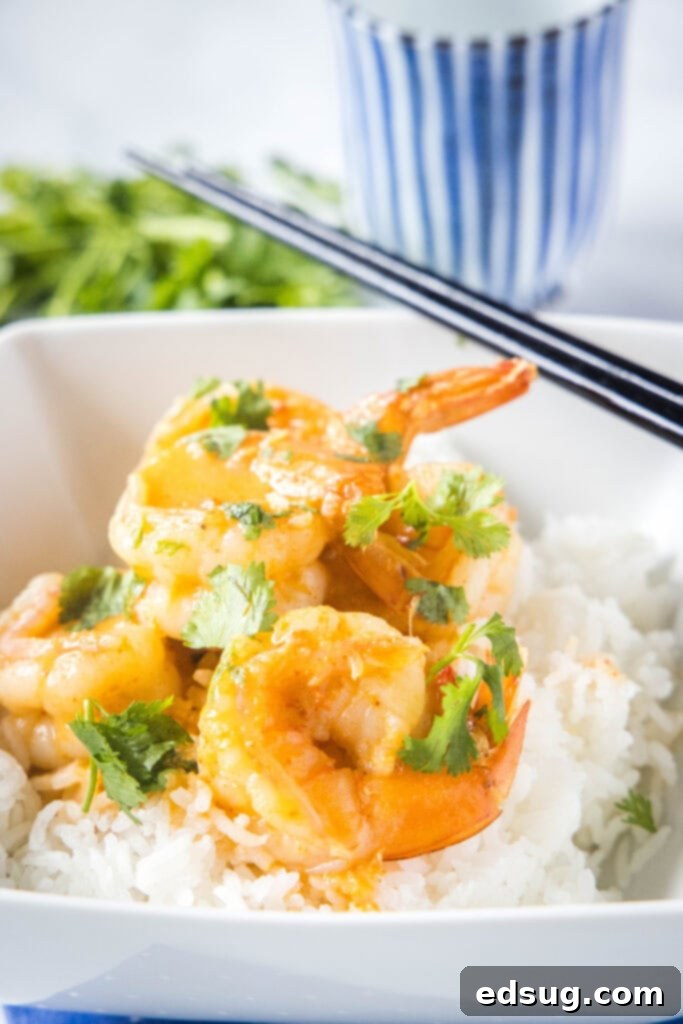
Enhance Your Curry: Adding Extra Veggies and Variations
This coconut curry shrimp is incredibly versatile, and adding extra vegetables is a fantastic way to boost its nutritional value and make it an even heartier meal. Think of it as a customizable stir-fry in a luscious curry sauce!
- Bell Peppers: Sliced bell peppers (any color) add sweetness, crunch, and vibrant color. Add them with the ginger and garlic for a slight softening, or later for more crunch.
- Onions: Sliced red or yellow onions can add a foundational sweetness. Sauté them before the ginger and garlic until softened.
- Broccoli or Cauliflower: Small florets can be added to the sauce and simmered until tender-crisp.
- Snow Peas or Snap Peas: These can be tossed in during the last few minutes of simmering for a fresh, crisp texture.
- Spinach or Kale: Wilt in a handful of fresh spinach or kale at the very end; their leaves will quickly cook down into the sauce.
- Mushrooms: Sliced mushrooms add an earthy depth. Sauté them until browned before adding other aromatics.
For protein variations, you could easily substitute shrimp with sliced chicken breast or thigh, firm tofu cubes (pressed and seared first), or even scallops. Adjust cooking times accordingly to ensure the protein is cooked through but not overdone.
Understanding Coconut Milk: The Heart of Your Curry
The type of coconut milk you use profoundly impacts the texture and flavor of your curry sauce. It’s crucial to select the right kind for this recipe:
Use Canned Coconut Milk: Always reach for canned coconut milk, which you’ll typically find in the Asian or baking aisle of your grocery store. This is concentrated coconut extract, giving you the rich, creamy consistency needed for curry.
Unsweetened is Key: Make sure the label specifies “unsweetened” coconut milk. Sweetened varieties are often used for desserts and would drastically alter the savory balance of your curry.
Full-Fat vs. Light:
- Full-Fat Coconut Milk: For a truly luxurious, rich, and thick sauce that clings beautifully to the shrimp and rice, full-fat canned coconut milk is your best bet. It provides a superior mouthfeel and depth of flavor.
- Light Coconut Milk: If you’re looking to reduce calories or fat, light coconut milk can be used. Be aware that your sauce might be thinner and slightly less creamy, but it will still deliver on flavor.
Avoid Carton Coconut Milk: Do not use the coconut milk found in the refrigerated dairy or non-dairy milk section (the kind you might drink or use in cereal). This type of coconut milk is significantly diluted with water and will not provide the necessary richness, thickness, or flavor for a proper curry sauce. It will result in a watery, insipid dish, so stick to the canned variety.
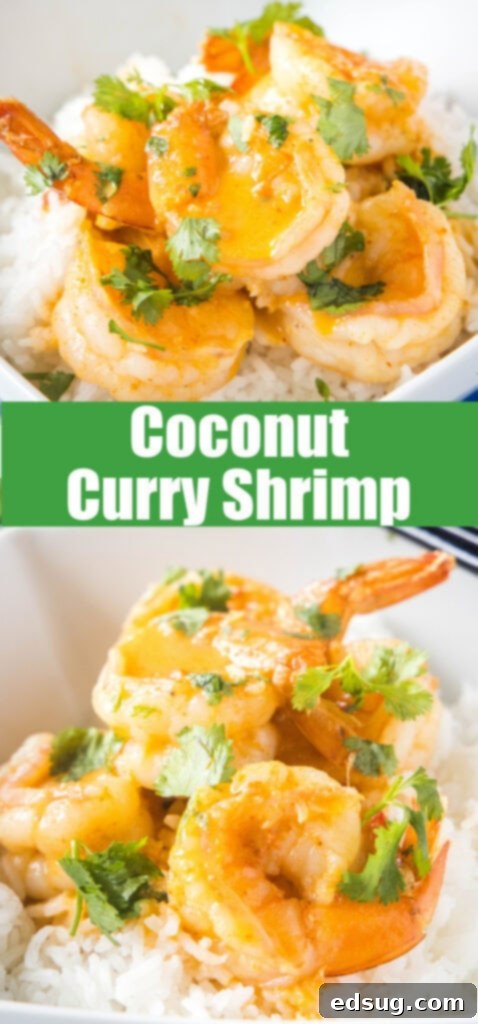
Perfect Pairings: What to Serve with Coconut Curry Shrimp
This versatile curry pairs wonderfully with a variety of side dishes that help soak up its exquisite sauce and complement its flavors. Here are some of my favorite serving suggestions:
- Steamed White Rice: Classic for a reason! Jasmine rice or basmati rice are excellent choices.
- Brown Rice or Quinoa: For a healthier, whole-grain option that still soaks up the sauce beautifully.
- Cauliflower Rice: A low-carb alternative that works surprisingly well, especially for those watching their carb intake.
- Noodles: Rice vermicelli or egg noodles can be tossed directly into the curry sauce before serving.
- Naan Bread or Roti: Warm, soft flatbreads are perfect for scooping up every last drop of the rich sauce.
- Steamed or Roasted Vegetables: A simple side of blanched green beans, asparagus, or roasted broccolini can add a fresh crunch.
- Lime Wedges: A squeeze of fresh lime juice just before serving brightens all the flavors.
Storage and Reheating Tips
Leftover Coconut Curry Shrimp can be a real treat! To store, transfer the curry to an airtight container and refrigerate for up to 2-3 days. While shrimp is best enjoyed fresh, this curry reheats quite well.
To Reheat:
- Stovetop: Gently reheat in a skillet over low-medium heat, stirring occasionally, until warmed through. You may need to add a splash of water or coconut milk to thin the sauce if it has thickened too much. Be careful not to boil, as this can toughen the shrimp.
- Microwave: Reheat in short bursts (30-60 seconds) in a microwave-safe dish, stirring in between, until hot.
Keep in mind that shrimp can become a bit firmer upon reheating, but the delicious sauce will still be fantastic.
More Easy Dinner Recipes You’ll Love
If you enjoyed this quick and flavorful curry, you’re in for a treat! Discover more of my favorite easy dinner recipes designed to make your weeknights delicious and stress-free:
- Crunchwrap Supreme
- Shrimp Summer Rolls
- Ranch Cheddar Chicken
- Crispy Baked Shrimp
- Instant Pot BBQ Chicken
- Cheeseburger Pizza
- Air Fryer Pork Chops
Coconut Curry Shrimp
Coconut Curry Shrimp – A quick and easy curry shrimp recipe you can make any night of the week! Plump shrimp nestled in a sweet coconut curry sauce, offering just the right amount of spicy kick.
Author: Erin Sellin
Prep Time: 10 minutes
Cook Time: 10 minutes
Total Time: 20 minutes
Servings: 4
Ingredients
- 1 pound large shrimp, peeled and deveined
- 1 Tablespoon olive oil
- 1 Tablespoon fresh ginger, grated
- 2 cloves garlic, grated or minced
- 1 cup full-fat canned coconut milk (unsweetened)
- 1 Tablespoon red curry paste
- 2 teaspoons fish sauce
- Salt and Pepper, to taste
- 2 green onions, chopped, for garnish
- Fresh cilantro, chopped, for garnish
- 2 cups cooked white rice, for serving
Instructions
- In a large skillet, heat the olive oil over medium-high heat. Add the grated ginger and garlic to the pan and cook for about 30 seconds, until fragrant.
- Stir in the red curry paste, mixing until it is well combined with the ginger and garlic. Allow it to cook for another minute to deepen the flavors.
- Add the peeled and deveined shrimp to the skillet. Toss everything together, ensuring the shrimp are thoroughly coated with the curry paste mixture.
- Pour in the coconut milk and fish sauce. Bring the mixture to a gentle simmer and cook for approximately 5-6 minutes, or until the shrimp turn pink and are cooked through. Be careful not to overcook them.
- Taste the curry sauce and adjust seasoning with salt and pepper as needed.
- Serve immediately over warm white rice, garnished generously with fresh cilantro and chopped green onions.
Notes
This recipe was adapted from Epicurean Mom.
Feel free to add your favorite vegetables like sliced bell peppers, spinach, or broccoli florets during step 4 to make it a more complete meal.
Nutrition (Approximate per serving)
- Serving: 1 (approx. 1g, assuming only the curry part)
- Calories: 391 kcal
- Carbohydrates: 28 g
- Protein: 30 g
- Fat: 18 g
- Saturated Fat: 12 g
- Polyunsaturated Fat: 5 g
- Cholesterol: 239 mg
- Sodium: 1481 mg
- Fiber: 1 g
- Sugar: 1 g
Nutrition information is automatically calculated and should be used as an approximation.
Additional Information
Course: Dinner Recipes
Cuisine: American (Thai-Inspired)
Keyword: curry shrimp, coconut shrimp, Thai curry, quick dinner
I’ve created a fun and engaging community group on Facebook, and I would absolutely love for you to join us! It’s a vibrant space where you can share your favorite recipes, ask cooking questions, get tips, and stay updated on all the exciting new recipes from Dinners, Dishes, and Desserts. Don’t miss out on any delicious updates!
Be sure to follow me on Instagram and tag #dinnersdishes so I can see all the wonderful creations YOU make from DINNERS, DISHES, AND DESSERTS!
Stay connected and ensure you never miss a post by following me on my social media channels:
Facebook | Twitter | Pinterest | Instagram
